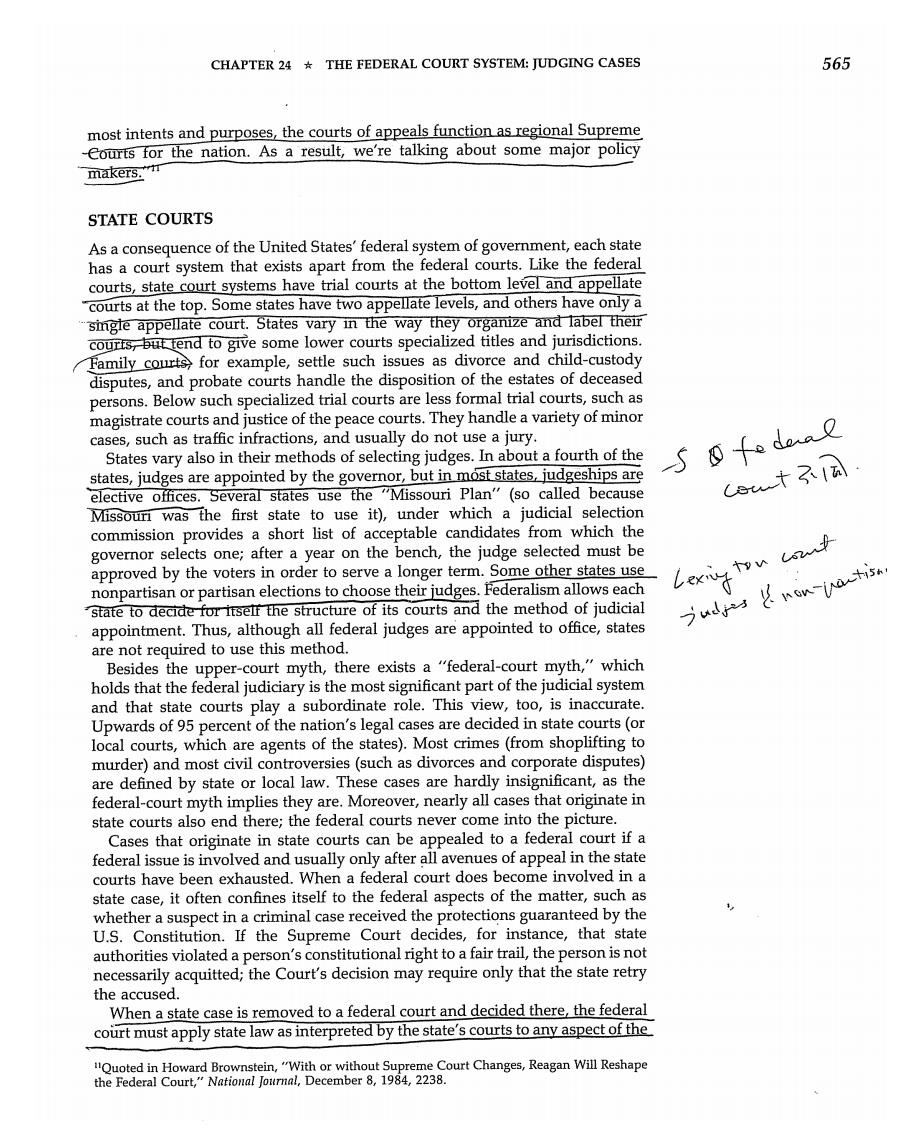正在加载图片...

CHAPTER 24 THE FEDERAL COURT SYSTEM:JUDGING CASES 565 most intents and purposes,the courts of appeals function as regional Supreme -Courts for the nation.As a result,we're talking about some major policy makers. STATE COURTS As a consequence of the United States'federal system of government,each state has a court system that exists apart from the federal courts.Like the federal courts,state court systems have trial courts at the bottom level and appellate courts at the top.Some states have two appellate levels,and others have only a single appellate court.States vary in the way they organize and label their courts,but tend to give some lower courts specialized titles and jurisdictions. Family courts,for example,settle such issues as divorce and child-custody disputes,and probate courts handle the disposition of the estates of deceased persons.Below such specialized trial courts are less formal trial courts,such as magistrate courts and justice of the peace courts.They handle a variety of minor cases,such as traffic infractions,and usually do not use a jury. States vary also in their methods of selecting judges.In about a fourth of the euQ states,judges are appointed by the governor,but in most states,judgeships are elective offices.Several states use the "Missouri Plan"(so called because (e十子a Missouri was the first state to use it),under which a judicial selection commission provides a short list of acceptable candidates from which the governor selects one;after a year on the bench,the judge selected must be approved by the voters in order to serve a longer term.Some other states use lexiiton lot nonpartisan or partisan elections to choose their judges.Federalism allows each state to decide for itself the structure of its courts and the method of judicial ブd&non-ati appointment.Thus,although all federal judges are appointed to office,states are not required to use this method. Besides the upper-court myth,there exists a"federal-court myth,"which holds that the federal judiciary is the most significant part of the judicial system and that state courts play a subordinate role.This view,too,is inaccurate Upwards of 95 percent of the nation's legal cases are decided in state courts(or local courts,which are agents of the states).Most crimes(from shoplifting to murder)and most civil controversies(such as divorces and corporate disputes) are defined by state or local law.These cases are hardly insignificant,as the federal-court myth implies they are.Moreover,nearly all cases that originate in state courts also end there;the federal courts never come into the picture. Cases that originate in state courts can be appealed to a federal court if a federal issue is involved and usually only after all avenues of appeal in the state courts have been exhausted.When a federal court does become involved in a state case,it often confines itself to the federal aspects of the matter,such as whether a suspect in a criminal case received the protections guaranteed by the U.S.Constitution.If the Supreme Court decides,for instance,that state authorities violated a person's constitutional right to a fair trail,the person is not necessarily acquitted;the Court's decision may require only that the state retry the accused. When a state case is removed to a federal court and decided there,the federal court must apply state law as interpreted by the state's courts to any aspect of the Quoted in Howard Brownstein,"With or without Supreme Court Changes,Reagan Will Reshape the Federal Court,"National Journal,December 8,1984,2238